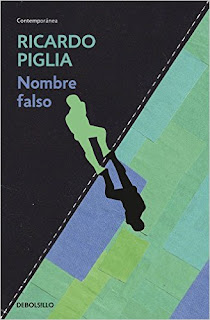by Ricardo Piglia
Argentina, 1975
5 short stories + 1 novella from the Argentine writer/critic whom Roberto Bolaño once memorably lampooned as the St. Paul to Roberto Arlt's Jesus Christ. Of the short stories, I'm most unabashedly evangelistic about "El Laucha Benítez cantaba boleros" ["Mousy Benítez Sang Boleros"] and "La loca y el relato del crimen" ["The Madwoman and the Story of the Crime"]--the former a sordid tale about an ex-heavyweight boxer reduced to eking out a living as "El Vikingo" ["The Viking"] in a traveling lucha libre troupe and the latter a sordid tale about a madwoman who appears to have witnessed the slaying of a prostitute outside a dancing-for-hire cabaret. The novella Nombre falso [Assumed Name; original title: Homenaje a Roberto Arlt or Homage to Roberto Arlt]--a great hoax which in its day was passed off as the critical edition of a just recently discovered/previously unpublished Arlt work but is in large part supposedly "borrowed" from the Spanish translation of Leonid Andreyev's The Dark--is definitely the cherry on the top of this hot fudge sundae of noirish, metafictional underhandedness, though. While both "El Laucha Benítez cantaba boleros" y "La loca y el relato del crimen" inhabit a recognizably post-Arltian spiritual landscape--the latter even includes an inside joke of a description about a reporter whose "concentrado y un poco metafísico" ["concentrated and somewhat metaphysical"] melancholy is said to resemble that of Roberto Arlt's characters (79)--the scene of the crime in Nombre falso shifts from Arlt's so-called "zona de la angustia" ["anguish zone"] to the mean streets of the text itself. For in what's billed as a homage to Roberto Arlt but is also a bottle smashing celebration of the joys of plagiarism, the supporting documentation for Piglia's spurious critical edition includes dialogue from "Arlt" ("¿Qué es robar un banco comparado con fundarlo?" ["What is robbing a bank compared with founding one?"]) mischievously lifted from Bertolt Brecht (111); notes to a rough draft from Arlt which actually are cribbed from Piglia's "La loca y el relato del crimen" (115-116); and an entirely convincing fabricated interview with a real life friend of Arlt's who maintains that Arlt's best work ever was the short story "Escritor fracasado" ["Failed Writer"]: "Eso es lo mejor que Roberto Arlt escribió en toda su vida. La historia de un tipo que no puede escribir nada original, que roba sin darse cuenta: así son todos los escritores en este país, así es la literatura acá. Todo falso, falsificaciones de falsificaciones" ["That's the best thing that Roberto Arlt wrote in all his life. The story of a guy who couldn't write anything original, who robs without realizing it: all the writers in this country are like that, that's what literature is here. All fake, falsifications of falsifications"] (140). Slick.
Ricardo Piglia






So now I get a possible context for Bolaño's take on banks:
ResponderBorrar"If I had to hold up the most heavily fortified bank in America, I'd take a gang of poets."
Plagiarism may be the best form of homage. And hoaxes provide some of the most imaginative stories.
I hadn't thought about the Bolaño/bank robber/Piglia thing in this context, but thanks for adding that to the discussion. A possibility! Like Piglia, Onetti also "self-plagiarizes" to great effect in the novel Let the Wind Speak which I read earlier in the year. A little unsolicited trivia for you...
BorrarThese sound very good.
ResponderBorrarIn regards to El Laucha Benítez Cantaba Boleros, it is so interesting that so much worthy literature is based upon washed up boxers. There seems to be something about the plight of such folks that strikes a chord in our collective psyches'.
I almost reviewed a collection of Argentinean boxing tales (which includes Piglia's "El Laucha Beníitez cantaba boleros" as it happens) for Spanish Lit Month, Brian, but in the end I decided just to write about a great novella from it for now. In any event, I agree with your point!
BorrarStupendous. I'm about to read that exact Andreyev story, which I am sure will give me a lot of insight into this book I have not read.
ResponderBorrarAfter trying to get a hold of Andreyev's Las tinieblas off and on for years, I finally have a copy supposedly winging its way to me. I'd also like to read his Seven Who Were Hanged, another possible influence on the "real" Arlt. Anyway, hopefully we can compare notes at some point. I enjoyed your Andreyev post earlier today.
BorrarInteresting. Not an author I'm familiar with, but I do like the sound of the noirish elements...
ResponderBorrarPiglia's written a handful of some of my favorite Argentinean works in various genres (novels, short stories, essays), Jacqui, and if you like the sound of the noirish aspects you should keep an eye out for his novel translated as Money to Burn: pure adrenaline and based on a true crime.
BorrarI read Piglia's Target in the Night during Spanish Lit Month but unfortunately didn't have time to blog it. However, I'm now planning to read more of his work.
ResponderBorrarGlad to hear you've caught the Piglia bug, Grant! I liked the novel you just read OK, but I think his Artificial Respiration and Money to Burn are way more intense/satisfying than Target in the Night (although I can't vouch for the translations or anything). Anyway, will look forward to seeing what you choose by him next.
Borrar